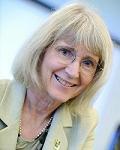 Eugenie C. Scott
Eugenie C. ScottNCSE's executive director was recently interviewed twice about science denial in on-line venues.
Speaking to Liza Gross for KQED's Quest series (August 21, 2012), Scott discussed the similarities between those who reject vaccines and those who reject evolution and climate change. In all of these cases of science anomalies, she explained, there is a tendency to construe anomalies as disproving accepted scientific views, motivated by religious or political ideologies or — as with vaccination — concern for their children. Noting that only a few are diehard science denialists, Scott commented, "I think we shouldn’t abandon the people who are in that one segment of society who are bound and determined not to accept vaccinations but we should really focus our attention more on keeping people from slipping down into that category. Certainly, that’s what we’ve done with evolution and that’s what we are likely to be doing with climate change as well."
Speaking to Paul Fidalgo for the Committee for Scientific Inquiry (August 22, 2012), Scott addressed the continuities and changes in the antievolution movement. "I am not surprised we're still dealing with attacks on evolution: It is a topic that generates a great deal of emotion, and that can prevent people from listening to the scientific evidence," she commented, but added, "this is not your grandfather's creationism." Tennessee's new antiscience law, which encourages teachers to present the "scientific strengths and scientific weaknesses" of topics such as evolution and climate change, is a case in point, she explained. The law presents these "as if they were topics that were of questionable validity in science. They may be controversial to the general public, but they certainly are not controversial among scientists."
Recent video interviews of NCSE staff are available at the Recent Interviews playlist on NCSE's YouTube channel.
